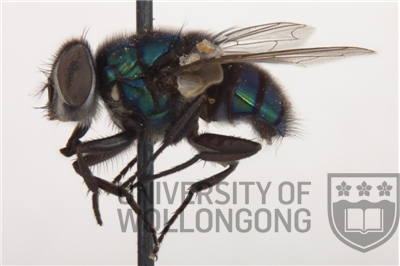Taxonomy
Family: Calliphoridae
Subfamily: Chrysomyinae
Genus: Chrysomya Robineau Desvoidy 1830
Species: nigripes Aubertin 1932
The first- and second-instar larvae were described by O'Flynn and Moorhouse (1980) and Sukontason et al. (2005). The third-instar was described by Sukontason et al. (2005).
Biology
This species
is distinguished by its dark metallic colouration. As a species
of Chrysomya, it
is unusual because it prefers carrion at an advanced
state of decomposition (O'Flynn 1983a). By contrast, most Chrysomya species
are attracted to carrion at early stages of
decomposition. It is common in the Brisbane district
(O’Flynn 1983a), particularly in summer. It is unlikely to
persist during winter. This species is not involved in
myiasis
of sheep. O’Flynn (1983b) provides some developmental
information on this species.
Distribution
This species
is distributed throughout New South Wales and Queensland.
Relevant Literature
Sukontason, K.L.,
Vogtsberger, R.C., Boonchu, N., Chaiwong, T., Sripakdee,
D., Ngern-Klun, R., Piangjai, S. and Sukontason, K. (2005)
Larval Morphology of Chrysomya nigripes (Diptera: Calliphoridae),
a fly species of forensic importance. Journal of Medical
Entomology 42, 233-240.
O'Flynn, M.A.
(1983a) Notes on the biology of Chrysomya nigripes
Aubertin (Diptera, Calliphoridae). Journal of the
Australian Entomological Society 22, 341-342.
O'Flynn, M.A. (1983b). The succession and rate of
development of blowflies in southern Queensland and the
application of these data to forensic entomology. Journal of the
Australian Entomological Society 22, 137-148.
O'Flynn, M.A. and
Moorhouse, D.E. (1980) Identification of early immature
stages of some common Queensland carrion flies. Journal of the
Australian Entomological Society 19, 53-61.


